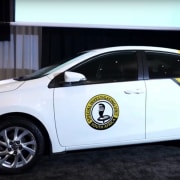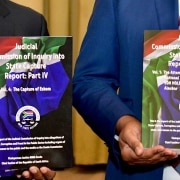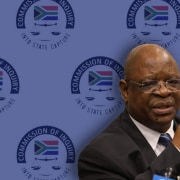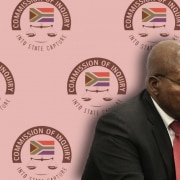|
Getting your Trinity Audio player ready...
|
The Auditor-General of South Africa (Agsa) is not impressed with the Department of Public Enterprises (DPE). Presenting the department’s audit outcomes for 2021/2022 to the parliamentary portfolio committee on public enterprises on 11 October, the Agsa delegation pointed out several shortcomings and weaknesses, including stagnation in terms of audit outcomes in general, and non-compliance with laws and regulations.
The DPE oversees seven state-owned enterprises (SOEs) – Eskom, Transnet, South African Airways (SAA), Alexcor, Denel, the South African Forestry Company Limited (Safcol), and SA Express. The latter is awaiting final liquidation.
South Africans will not be surprised by this news, given that the dismal performance of these SOEs has been well-documented over a long period.
“Overall, the audit outcomes have remained stagnant with no notable improvement in outcomes in the current year to achieve clean audit,” said Agsa in its presentation to the committee.
There were no clean audits – the DPE itself received a qualified audit – but there was 63% worth of outstanding audits, from five of the seven entities, six months after the close of the financial year.
SAA has not yet submitted its annual financial statements (AFS) for the 2022-23 financial year. SA Express has not submitted statements for four years, as it counts down to liquidation. Denel is still busy with catch-up audits from 2020-21 up to the present, and Alexcor is also busy with a catch-up audit for 2022-23.
Meanwhile at Eskom, “Auditors experienced significant delays with access to critical investigation reports that have material impact on the AFS. Possible write-downs on assets identified late – management is still calculating the values. We anticipate audit conclusion by the end of November 2023.”
Stagnation
Agsa found that reasons for the stagnation included many vacancies and instability in leadership, ineffective audit action and turnaround plans, poor record-keeping, dysfunctional internal auditing and internal monitoring of performance against targets, lack of accountability in terms of improvement in financial and performance reporting, and poor consequence management.
Performance planning and reporting were also sub-optimal, said Agsa, with weaknesses revealed that could not be corrected, such as changes to the AFS which had not been approved.
There are several reasons for this planning and reporting inadequacy, said Agsa, such as poor year-on-year monitoring of progress, a slow response by the DPE to make recommended changes, and inadequate reviews of the planning document and annual performance report.
Oversight generally is also affected by poor planning and reporting, said Agsa, because limitations, Indicators, and targets are not output-based, not relevant, and not well defined. “The failure to reflect key commitments belittles oversight and does not provide adequate insight on whether entities or departments are fit for purpose.”
Ultimately, service delivery is negatively affected and SOEs are unable to contribute to improving the economy. Rather, they drag it down.
Transnet was singled out for its particularly bad performance. This SOE managed to deteriorate even further, meeting only 26.32% of its annual targets in the current year, compared to the previous year’s 38.64% – a decline of 12.32%. For the umpteenth time, therefore, it is unable to fulfil its mandate of assisting in lowering the cost of doing business in South Africa and enabling economic growth and security of supply by providing appropriate ports, rail, and pipeline infrastructure. It also hampers economic growth and impedes Transnet’s ability to effectively compete in the global market.
“The non-achievement of planned targets further contributes to increased reliance on road transportation, leading to higher costs, road congestion, damage to road infrastructure, and negative environmental impacts.”
In terms of overall irregular expenditure, the total recorded for the year was R563-million. The top contributors were Transnet (R556-million), Safcol (R3.8-million), and the DPE (R3.1-million).
Dire situation
The DPE itself achieved just 58% of its targets for the year and spent 74% of its overall budget, partly because of vacancies that were still present by year-end.
“The low achievement rate directly links to the current stagnation on the SOEs’ performance,” said Agsa. “The department and its entities struggle with low performance rates on their mandate and service delivery objectives”.
All these factors indicate “an environment that is failing to implement robust financial management systems and produce credible financial reporting”.
Disturbingly, compliance with laws and regulations is still “a challenge” for the DPE portfolio, said Agsa.
Committee members were rightly dismayed. ANC members conceded that on the evidence presented, the situation was not good and was clearly in decline. ANC MP Sibusiso Gumede commented that as MPs, their job is to ask questions about situations and developments, but it did not seem to him that those questions were being turned into progress.
“We need to revisit the issue of powers of the MPs.”
“It’s not often that I don’t know what to say,” commented Ghaleb Cachalia of the DA. “We’re in deep trouble … It’s a dire situation that needs remedying, but we need to understand, now that the facts have been presented and accepted, that in the entities, their boards, the shareholders, and the department that is responsible for overseeing – in every single part there has been significant failure.”
This raises not just a red flag, he added, but “a red banner”.
“Despite casting himself as an anti-corruption crusader who was going to clean up the mess created by the merchants of state capture, Gordhan has failed dismally,” Cachalia said later in a statement. “Major SOEs like Transnet and Eskom are teetering on the brink of collapse, and in doing so, threatening to destroy the South African economy as we know it.”
This sorry state of affairs is entirely in the hands of leadership to change. “The entities’ slow recovery will persist unless leadership diagnoses and responds promptly to the weaknesses noted in the Zondo commission,” said Agsa, adding that it is, in fact, “necessary” to address the Zondo commission’s recommendations that apply to SOEs.
Agsa also recommended decisive actions to be taken against those SOEs that failed to submit financial statements, urgently finalising and implementing government’s planned SOE reforms including the Shareholder Management Bill and SOE funding criteria, and the committee’s continued oversight over the implementation of commitments made by accounting authorities and officers in resolving material irregularities, among others.








